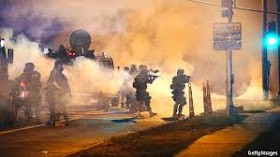 |
| Ferguson. Curious spectacle |
I particularly enjoyed the description of the events by Darren Wilson,the policeman who fired the shots that killed Mike Brown.
He painted a picture of Brown that was nothing short of terrifying. This huge man had reached in through the window of the police car and rained blows upon Wilson. It must have been appalling. I suppose we should at least be grateful that the blows left so few marks on Wilson’s face; or perhaps he simply has a capacity to heal from his wounds that far outstrips any ordinary person’s.
It may be an effect of the internal glow Wilson derives from having such an easy conscience: he has, indeed, assured us that his conscience is completely clear.
Things got even worse after this first nightmarish incident. The colossus, Brown, came after Wilson, furious and petrifying in his power. Let’s not forget that Brown had massive physical strength, while Wilson had only a gun to defend himself. He fired on Brown several times, and must have hit him more than once, because, as he declared, he saw him “flinch” several times. Despite all that Brown kept coming on until finally Wilson had to finish him off with a bullet to the head.
It must have been terrible. For that poor Mr Wilson.
Wilson, cool and in control, fired twelve shots at Brown. Whereas Brown was really, really rude to him. And threatening. Why, he looked as though he might have been armed. Of course, Wilson actually was armed whereas Brown wasn’t, but hey, it might have been the other way round.
Gary Younge reported on all this for the Guardian. He quoted Barack Obama commenting on the Grand Jury’s decision not to indict Wilson, “we are a nation based on the rule of law so we need to accept that this was the special jury’s decision to make.” But Younge adds his own gloss:
The trouble is that the United States, for far longer than it has been a “nation of laws”, has been a nation of injustice. And in the absence of basic justice such laws can amount to little more than codified tyranny. When a white cop, Darren Wilson, shoots an unarmed black teenager, Michael Brown, dead and then is not indicted, the contradiction is glaring. For a world where it is not only legal for people to shoot you dead while you walk down the street, but where they can do so in the name of the law, is one in which some feel they have nothing to lose.
 |
| Gary Younge. Well worth reading in the Guardian |
… the legislation and histories of the times, and the language used in the Declaration of Independence, show that neither the class of persons who had been imported as slaves nor their descendants, whether they had become free or not, were then acknowledged as a part of the people, nor intended to be included in the general words used in that memorable instrument.
It is difficult at this day to realize the state of public opinion in relation to that unfortunate race which prevailed in the civilized and enlightened portions of the world at the time of the Declaration of Independence and when the Constitution of the United States was framed and adopted. But the public history of every European nation displays it in a manner too plain to be mistaken.
They had for more than a century before been regarded as beings of an inferior order, and altogether unfit to associate with the white race either in social or political relations, and so far inferior that they had no rights which the white man was bound to respect, and that the negro might justly and lawfully be reduced to slavery for his benefit.
Who wrote these ringing words? Why, Roger Taney, Chief Justice of the United States Supreme Court, speaking for the majority in its decision of what has come to be known as the Dred Scott case. Scott was a slave who claimed that having been taken from a slave state, Missouri, to a free state, Illinois, he was in effect a free man. The Court decided that as a “negro” he was not a citizen of the United States and had no right to sue in its courts.
 |
| Dred Scott. A slave from Missouri And absolutely not a citizen, according to the Supreme Court |
What’s interesting is that the War and the Amendments clearly didn’t change that much. As Gary Younge points out, the Ferguson events are a continuation of an important trend in US history, not an interruption of it.
Roger Taney would have have been proud.
No comments:
Post a Comment